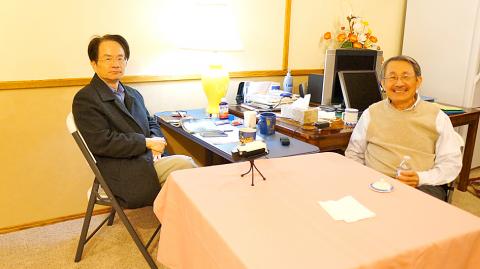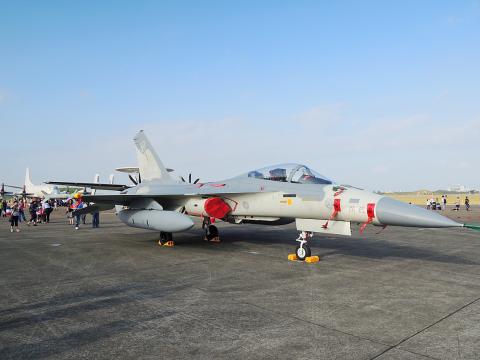Taiwan had plans to load miniaturized nuclear weapons into auxiliary fuel tanks of Indigenous Defense Fighter (IDF) jets to attack China, said Chang Hsien-yi (張憲義), who was the deputy director of the First Institute of the Chungshan Institute of Science and Technology (CSIST) and who defected to the US in 1988.
Due to the growing military threat from China, Taiwan during the 1980s conducted numerous military projects, including the research and development of mid-range surface-to-surface ballistic missiles, a nuclear weapons research project and the IDF project, Chang was quoted as saying in a new book that was based on an interview by Academia Sinica associate research fellow Chen Yi-shen (陳儀深), who last year went to the US to interview Chang.
Chang, a former colonel, said that the CSIST planned to use the IDF as a bomber because it was developed by Taiwan and its range could be fine-tuned without consulting other nations.

Photo provided by Walkers Cultural Publisher
“We wanted to extend the IDF’s range to 1,000km, as it would also extend the effective range of the nuclear weapon,” Chang was quoted as saying.
The plan was for a pilot — unmarried with no family and not having been told that they would be carrying a nuclear weapon — to fly the aircraft, Chang said.
With a nuclear weapon in the auxiliary fuel tank, the fighter jet would have a range of 800km, Chang said, adding that the pilot would only be told that they would be going on a mission from which they would probably not return.

Photo: Lo Tien-pin, Taipei Times
However, Chang said that the plan put ongoing US support at risk, adding that it was because of Taiwan’s ambitions that the US decided to “put the cards on the table.”
It was also because of this project that the US in 1988 forced Taiwan to shut down all facilities related to the development of nuclear weapons, as well as shuttering a heavy water reactor at the CSIST, Chang said.
When asked about his relationship with the US and the CIA, Chang said he was contacted by the CIA in 1982 and the agency established a task force on Taiwan and nuclear arms after he passed a polygraph test, adding that he would meet with CIA personnel every two or three months near Shilin (士林) night market in Taipei, mostly discussing what the government was purchasing for its nuclear weapons research, or the contents of CSIST or government meetings.
The CIA arranged his exit from Taiwan in 1988 by having a company registered in the US issue him a work visa and a new passport, providing a cover for him to fly from Kaohsiung to Seattle via Hong Kong, Chang said, adding that his wife transferred flights in Japan and met with him in the US.
Democratic Progressive Party Legislator Lo Chih-cheng (羅致政) yesterday said the decision to develop a nuclear deterrent had spanned military strategy, politics and diplomacy.
The US’ intervention was anticipated and reflective of the US as a hegemonic power, Lo said, but added that the US’ move was inexorably tied to Chang’s defection.
Putting aside the question of a soldier’s loyalty to his nation, and the moral question of developing nuclear weapons, Chang — while having been shielded from the Taiwanese judiciary — will have to answer to history for his actions, Lo said.
Meanwhile, a senior Ministry of National Defense official yesterday said that the nation’s policy regarding nuclear weapons is that “we do not manufacture, own or use nuclear weapons,” adding that since Taiwan does not have nuclear weapons, the possibility of attacking China with nuclear weapons does not exist.

Intelligence agents have recorded 510,000 instances of “controversial information” being spread online by the Chinese Communist Party (CCP) so far this year, the National Security Bureau (NSB) said in a report yesterday, as it warned of artificial intelligence (AI) being employed to generate destabilizing misinformation. The bureau submitted a written report to the Legislative Yuan in preparation for National Security Bureau Director-General Tsai Ming-yen’s (蔡明彥) appearance before the Foreign Affairs and National Defense Committee today. The CCP has been using cognitive warfare to divide Taiwanese society by commenting on controversial issues such as Taiwan Semiconductor Manufacturing Co’s (TSMC, 台積電) investments in the

INVESTIGATION: The case is the latest instance of a DPP figure being implicated in an espionage network accused of allegedly leaking information to Chinese intelligence Democratic Progressive Party (DPP) member Ho Jen-chieh (何仁傑) was detained and held incommunicado yesterday on suspicion of spying for China during his tenure as assistant to then-minister of foreign affairs Joseph Wu (吳釗燮). The Taipei District Prosecutors’ Office said Ho was implicated during its investigation into alleged spying activities by former Presidential Office consultant Wu Shang-yu (吳尚雨). Prosecutors said there is reason to believe Ho breached the National Security Act (國家安全法) by leaking classified Ministry of Foreign Affairs information to Chinese intelligence. Following interrogation, prosecutors petitioned the Taipei District Court to detain Ho, citing concerns over potential collusion or tampering of evidence. The

‘COMPREHENSIVE PLAN’: Lin Chia-lung said that the government was ready to talk about a variety of issues, including investment in and purchases from the US The National Stabilization Fund (NSF) yesterday announced that it would step in to staunch stock market losses for the ninth time in the nation’s history. An NSF board meeting, originally scheduled for Monday next week, was moved to yesterday after stocks plummeted in the wake of US President Donald Trump’s announcement of 32 percent tariffs on Taiwan on Wednesday last week. Board members voted to support the stock market with the NT$500 billion (US$15.15 billion) fund, with injections of funds to begin as soon as today. The NSF in 2000 injected NT$120 billion to stabilize stocks, the most ever. The lowest amount it

NEGOTIATIONS: Taiwan has good relations with Washington and the outlook for the negotiations looks promising, Minister of Economic Affairs J.W. Kuo said Taiwan’s GDP growth this year is expected to decrease by 0.43 to 1.61 percentage points due to the effects of US tariffs, National Development Council (NDC) Minister Paul Liu (劉鏡清) said at a meeting of the legislature’s Economics Committee in Taipei yesterday, citing a preliminary estimate by a private research institution. Taiwan’s economy would be significantly affected by the 32 percent “reciprocal” tariffs slapped by the US, which took effect yesterday, Liu said, adding that GDP growth could fall below 3 percent and potentially even dip below 2 percent to 1.53 percent this year. The council has commissioned another institution